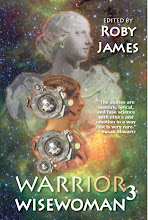I was cruising the Web last night and found this article about current trends in urban fantasy and romance. I think this blogger has pinpointed the current problem exactly. Everything she mentions in her article is something I've seen time after time in both genres, and I'd have to agree with her; each of these trends is becoming very, very old. For writers, this is definitely worth a look, and publishers might do well to take a look themselves.
Sunday, July 17, 2011
Thursday, July 14, 2011
Inspiration
People have asked from time to time where writers get their ideas. Of course, there's no one answer that works for everyone. One old gem of wisdom (read: one opinion as stated by one writer in the past but which may not work for everyone) that is often bandied about as advice to new writers is "Write what you know." That's fine, sort of. We do tend to write what we know, or we tend to write about what is familiar to us or what, in modern parlance, "resonates" with us. However, that old bit of advice to "write what you know" is a bit limiting, in my opinion. If a writer is drawn to something strongly enough, be it a locale, job description, way of life or belief system, the dedicated writer will do the necessary research to learn enough about it to write about it convincingly. You don't have to have known or practiced something for decades in order to write about it, though you should obviously care about your subject. Caring shows in the writing. Attention to detail shows. Writers write about what they're drawn to or what fascinates them. Just about anything in this world can spark enough fascination to inspire a book or story. If we could only write about those things with which we were already familiar, we'd miss out on so many opportunities for learning new things!
When I sat down to write my short story "The Truth One Sees," I'd just been looking for a new deck of tarot cards. I read tarot professionally, and I've tried quite a few different decks. I'd learned about a new deck that would be released before long, called "The Transparent Tarot." The concept completely fascinated me. The cards are made of transparent plastic, as thin as normal cards but allowing for hundreds of additional possibilities. They can be stacked on top of one another to present a multi-layered picture of events in a normal layout, or they can be drawn one at a time and then arranged in order, giving the impression of a series of events and symbols. The possibilities and potentials for ways to use this deck are many, if not endless.
As I looked at the preliminary information about that deck, the clear, stackable cards made me think of holograms. That got me wondering what a holographic tarot deck would be like. What would a Tarot reading be like if one could go into a holographic theater such as a holodeck from Star Trek, and experience the reading there? The notion intrigued me so much that I sat down one night and wrote "The Truth One Sees," in which my psychic main character uses an interactive holographic tarot deck for her readings. However, in the story, some of the hologram figures are not simply holograms, but sentient beings with an agenda of their own. Turns out my fictional aliens had phase-shifted themselves and all of their cities into another dimension so as to avoid potential bloodshed and conflict with the invading humans. As I explored the concept of humans colonizing a planet without being aware that they'd just displaced an entire native civilization, I soon found myself with the first and only science fiction story I've ever written.
This story made me stretch my boundaries in ways that my fantasy fiction hadn't done. Suddenly I found myself writing about a world where what I'd previously viewed and written as magic had to be explainable with science. Suddenly I needed to use terms like "quantum decision points" and "temporal interface," and come up with a possible cause of sudden death for a pilot whose shuttle had malfunctioned. It was a far cry from my usual fare, but all my usual metaphysical underpinnings were still there. After all, what is a spirit or a ghost to the typical human but just another being who is not currently in the same dimensional or vibratory phase that we are? And does it really matter whether people in a future society could transmit information mentally to one another via actual telepathy or through a special implant in the brain? As long as the effect is the same, it doesn't really matter whether you view it as science or magic. So despite the fact that it was a definite departure from my usual writing fare, I completely enjoyed it, and it took me to places where I'd never gone before--or at least not quite in that way.
There have been a couple of reviewers who stated that they wanted to see more of the world of this story. As a primarily fantasy writer, I suppose actually writing a whole science fiction novel would be my equivalent of skydiving. At this point, I'm still standing in the open hatchway of the plane, wondering whether to jump. Science fiction would be my wild blue yonder, and the fantasy I truly love would be my perfectly good airplane.
Posted by
KHurley
at
9:55 PM
0
comments
![]()
![]()


